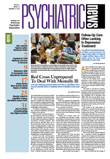Fabiano Nery, M.D., a Brazilian psychiatrist who also completed a residency in internal medicine, has long been fascinated by the interface between psychiatric and medical illnesses—and especially by the interface between depression and the autoimmune disease systemic lupus erythematosus.
In 2004, while affiliated with the University of Sao Paulo Medical School, he designed a study to get more insight into possible causes of depression in lupus patients—say, stressful life events or damage to the brain inflicted by lupus. He was particularly interested in the latter possibility since lupus, unlike the autoimmune disease rheumatoid arthritis, is known to be capable of damaging the brain. The brain involvement can be either widespread or focal and may involve inflammation of small blood vessels or interaction of autoantibodies with antigens on neuronal cell membranes.
Seventy-one subjects with lupus were evaluated for the presence of major depressive disorder, the intensity of depression, life events during the previous six months that had had a negative and pronounced impact on their lives, and lupus disease activity. Other health information about the subjects, such as medication use, was also collected.
Sixteen of the 71 subjects (23 percent) met DSM-IV diagnostic criteria for a current major depressive disorder. This finding did not surprise the investigators since other studies have found high rates of major depression in lupus subjects.
Prednisone, a medication used to treat lupus and known sometimes to produce depression, did not seem to explain this high rate of depression because the amount of prednisone used by subjects with and without depression was essentially the same. Yet nine of the 16 subjects with major depression reported having experienced at least one major negative life event during the previous six months, compared with 13 of the 55 subjects without a major depression—a statistically significant difference. This finding suggested that potent negative events might have precipitated the depression. Also, the severity of subjects' depression was associated with having experienced negative life events, which likewise strengthened the argument that negative events could trigger such depression.
Subjects with major depression, however, had more severe lupus disease activity than did those without a major depression, with a trend toward statistical significance. This finding implied that lupus disease activity might have triggered the depression, and another result bolstered this possibility: Even when stressful life events were taken into consideration, there was still a highly significant link between depression severity and disease activity.
Thus, it looks as if both negative life events and lupus disease activity may lead to major depression in lupus patients, Nery and his group concluded in their study, which is in press with Comprehensive Psychiatry.
Nonetheless, as Nery told Psychiatric News, “if a lupus flare-up can truly trigger depression, then there is still the question of whether the depression is due to brain damage by the disease or whether the patient becomes depressed in reaction to the disease. I would say that both can occur, probably at the same time in the same patient.
“My plan,” he continued, “is to use neuroimaging tools to determine whether specific brain areas associated with mood regulation are damaged during a lupus flare, and try to use these tools to disentangle factors such as psychosocial stress and biological and psychological factors in the development of mood disorders.”
When asked whether these findings have any practical implications for clinical psychiatrists, he replied, “Yes, absolutely. When evaluating depressed patients with systemic lupus erythematosus, consider that the disease activity is an important risk factor for the worsening of the depression.”
The study was funded by Fundacao de Amparo a Pesquisa do Estado de Sao Paulo and Conselho de Desenvolvimento Tecnologico e Cientifico.
An abstract of “Major Depressive Disorder and Disease Activity in Systemic Lupus Erythematosus” can be accessed at<www.sciencedirect.com> by clicking on “Browse A-Z of journals,” then “C,” then “Comprehensive Psychiatry.” ▪
